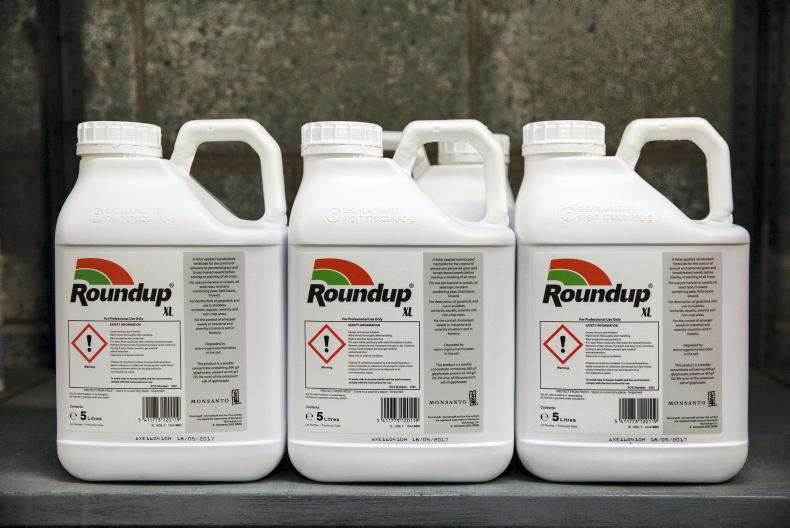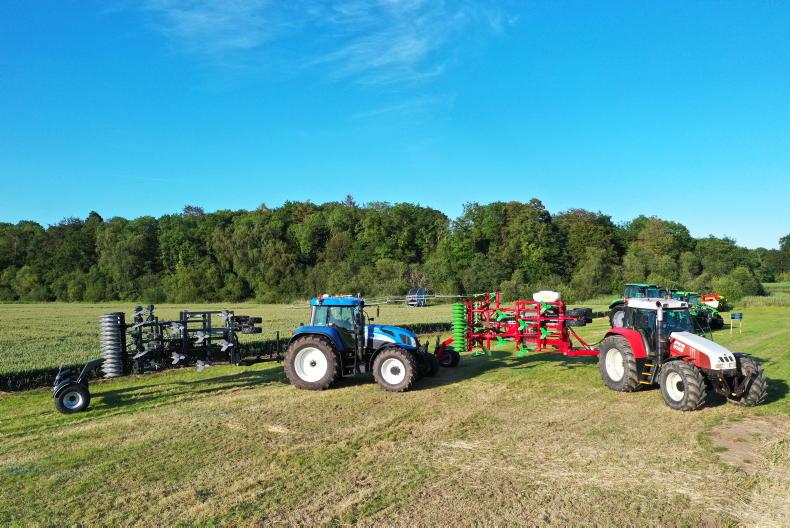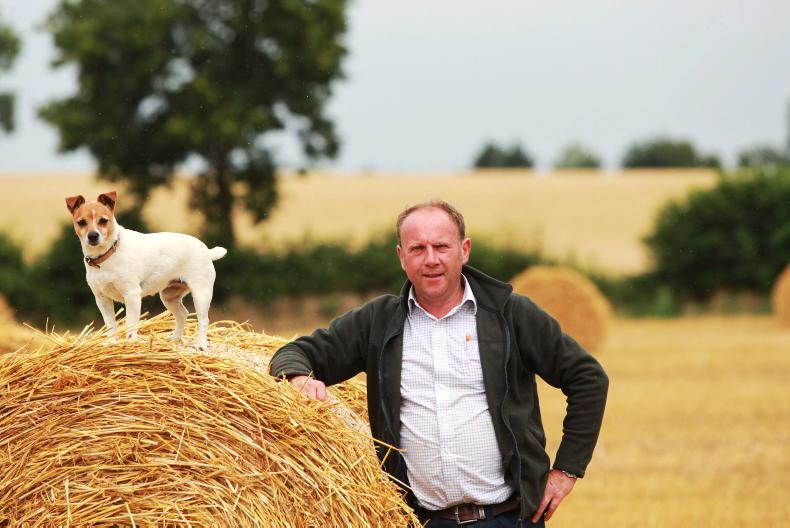There is a character in the wonderful South Park named Mr MacKay, a counsellor at South Park Elementary.
His catchphrase is “drugs are bad m’kay”, a black and white view.
This week, MEPs called for glyphosate to be banned across the EU from 2023 onwards.
In Ireland, only half of glyphosate usage is on farms, the rest is amenity areas, parklands, golf courses.
The 'Biodiversity Strategy for 2030: Bringing nature back into our lives' was supported by over 500 MEPs and only opposed by 90 when it was brought to the floor of the parliament, having been prepared by the environment committee.
Of course, farming has to accept that chemistry that is proven to be harmful must be taken off the market.
Last year, chlorothalonil, a staple part of fungicide control in tillage crops, was permanently removed.
IPU, an effective grassweed control in cereals, was banned in 2017. But glyphosate is a different matter.
Culture war
Glyphosate, or more accurately Roundup, has divided opinion for generations.
Developed by US company Monsanto, it was introduced in the 1970s as a miracle herbicide, killing all weeds. It was expensive and only used sparingly.
The patent has long expired and the market is awash with glyphosate products - it’s not a cheap but still effective product.
Of course, farmers love it. And it is relatively safe to handle, of course using all the appropriate precautions any properly trained professional user (PU) routinely employs.
Wood dust, diesel and ethanol have also been found to be carcinogenic
Monsanto was a controversial company before Roundup was ever brought to the market.
In the 1960s, it was one of the companies that produced an organophosphate that became known as Agent Orange.
Wood dust, diesel and ethanol have also been found to be carcinogenic. Ethanol is present in alcoholic drinks. Not many MEPs are calling for the banning of any of those.
The precautionary principle is being applied and perhaps that is the correct approach.
If so, any MEP supporting the banning of glyphosate could hardly support the legalisation of cannabis; that would be completely contradictory.
And yet, that is the case, despite the carcinogenic. And what of tobacco, responsible for huge numbers of cancer cases every year. Nothing but silence.
I’m not taking an opinion on these matters, I’m no expert. I am saying that it seems that farming seems an easy target.
Why does glyphosate matter?
The availability of glyphosate is crucial to the advancement of no-till and to a lesser extent eco-till farming.
Farmers are being encouraged to change from routinely ploughing their tillage ground annually.
When ploughing, some of the carbon sequestered in the soil following the growing of a crop is lost to the atmosphere.

Min-till and zero-till equipment, like this Claydon drill, does not come cheap.
No-till, coupled with the growing of cover crops to ensure the soil is not bare through its fallow winter months, improves the carbon footprint of crop growing.
Why is glyphosate important?
Well, ploughing - turning over the soil - gets rid of existing cover crop, of weeds, and leaves clean ground for the new crop to be planted in and establish itself without competition.
In the existing foliage, the absence of ploughing or other cultivation, chemical control of weeds is the only option.
It’s a classic pincer trap for farmers.
EU: “We want you to not plough and you must grow cover crops.”
Farmers: “OK, I’m doing as you asked, and it’s working OK, thanks to glyphosate.”
EU: “About that, you can’t use glyphosate any more.”
The World Health Organisation (WHO), which is the one calling glyphosate carcinogenic, has just come out and said that women “of child-bearing age” should be “prevented” from drinking alcohol.
It sounds like something from The Handmaid’s Tale, and will surely be ridiculed. Will it discredit some of its other diktats?
“They came for the glyphosate and I said nothing. Next they came for the gin and tonic…”
Swiss say no
Of course, it’s right that we constantly question the use of pesticides. But blanket bans are hardly the approach.
Yet, that is what was proposed in Switzerland. One of the questions considered by referendum last weekend was that all pesticides should be banned from use in farming by 2030.
Thankfully, the proposal was rejected by over 60% of voters. The government also opposed the motion.
Under Switzerland’s rather unique form of partially direct government, proposals can be forwarded by petition, which was the case in this instance.
Science
In all of these things, the science will rarely be absolute. This is particularly true of health risks, whether it’s a vaccine for COVID-19 or a fungicide for blight in potatoes, it’s very hard to prove a negative, and also very hard to develop anything of use with no risks attached.
We saw over €4bn wiped off Coca-Cola’s value in the 24 hours following Cristiano Ronaldo’s removal of a bottle of Coke from his table
In the modern world, the approach and attitude of influencers can be defining - we saw over €4bn wiped off Coca-Cola’s value in the 24 hours following Cristiano Ronaldo’s removal of a bottle of Coke from his table at a post-match press conference.
As farmers, we must trust that our politicians, whether in Brussels, Strasbourg, Dublin or around the country, don’t join populist bandwagons believing the myth that we can transition to food production without chemical assistance overnight.
The consequences of such a drastic experiment would be catastrophic for farmers, and probably for the poorest people on earth. If there are food shortages, they won’t be in Switzerland.
An economy propped up with centuries of dirty money will be able to afford to outbid the people of Burkina Faso, Guyana or Nepal for food, even food being grown in their own countries.
That’s one lesson no-one needs to tell the Irish.
There is a character in the wonderful South Park named Mr MacKay, a counsellor at South Park Elementary.
His catchphrase is “drugs are bad m’kay”, a black and white view.
This week, MEPs called for glyphosate to be banned across the EU from 2023 onwards.
In Ireland, only half of glyphosate usage is on farms, the rest is amenity areas, parklands, golf courses.
The 'Biodiversity Strategy for 2030: Bringing nature back into our lives' was supported by over 500 MEPs and only opposed by 90 when it was brought to the floor of the parliament, having been prepared by the environment committee.
Of course, farming has to accept that chemistry that is proven to be harmful must be taken off the market.
Last year, chlorothalonil, a staple part of fungicide control in tillage crops, was permanently removed.
IPU, an effective grassweed control in cereals, was banned in 2017. But glyphosate is a different matter.
Culture war
Glyphosate, or more accurately Roundup, has divided opinion for generations.
Developed by US company Monsanto, it was introduced in the 1970s as a miracle herbicide, killing all weeds. It was expensive and only used sparingly.
The patent has long expired and the market is awash with glyphosate products - it’s not a cheap but still effective product.
Of course, farmers love it. And it is relatively safe to handle, of course using all the appropriate precautions any properly trained professional user (PU) routinely employs.
Wood dust, diesel and ethanol have also been found to be carcinogenic
Monsanto was a controversial company before Roundup was ever brought to the market.
In the 1960s, it was one of the companies that produced an organophosphate that became known as Agent Orange.
Wood dust, diesel and ethanol have also been found to be carcinogenic. Ethanol is present in alcoholic drinks. Not many MEPs are calling for the banning of any of those.
The precautionary principle is being applied and perhaps that is the correct approach.
If so, any MEP supporting the banning of glyphosate could hardly support the legalisation of cannabis; that would be completely contradictory.
And yet, that is the case, despite the carcinogenic. And what of tobacco, responsible for huge numbers of cancer cases every year. Nothing but silence.
I’m not taking an opinion on these matters, I’m no expert. I am saying that it seems that farming seems an easy target.
Why does glyphosate matter?
The availability of glyphosate is crucial to the advancement of no-till and to a lesser extent eco-till farming.
Farmers are being encouraged to change from routinely ploughing their tillage ground annually.
When ploughing, some of the carbon sequestered in the soil following the growing of a crop is lost to the atmosphere.

Min-till and zero-till equipment, like this Claydon drill, does not come cheap.
No-till, coupled with the growing of cover crops to ensure the soil is not bare through its fallow winter months, improves the carbon footprint of crop growing.
Why is glyphosate important?
Well, ploughing - turning over the soil - gets rid of existing cover crop, of weeds, and leaves clean ground for the new crop to be planted in and establish itself without competition.
In the existing foliage, the absence of ploughing or other cultivation, chemical control of weeds is the only option.
It’s a classic pincer trap for farmers.
EU: “We want you to not plough and you must grow cover crops.”
Farmers: “OK, I’m doing as you asked, and it’s working OK, thanks to glyphosate.”
EU: “About that, you can’t use glyphosate any more.”
The World Health Organisation (WHO), which is the one calling glyphosate carcinogenic, has just come out and said that women “of child-bearing age” should be “prevented” from drinking alcohol.
It sounds like something from The Handmaid’s Tale, and will surely be ridiculed. Will it discredit some of its other diktats?
“They came for the glyphosate and I said nothing. Next they came for the gin and tonic…”
Swiss say no
Of course, it’s right that we constantly question the use of pesticides. But blanket bans are hardly the approach.
Yet, that is what was proposed in Switzerland. One of the questions considered by referendum last weekend was that all pesticides should be banned from use in farming by 2030.
Thankfully, the proposal was rejected by over 60% of voters. The government also opposed the motion.
Under Switzerland’s rather unique form of partially direct government, proposals can be forwarded by petition, which was the case in this instance.
Science
In all of these things, the science will rarely be absolute. This is particularly true of health risks, whether it’s a vaccine for COVID-19 or a fungicide for blight in potatoes, it’s very hard to prove a negative, and also very hard to develop anything of use with no risks attached.
We saw over €4bn wiped off Coca-Cola’s value in the 24 hours following Cristiano Ronaldo’s removal of a bottle of Coke from his table
In the modern world, the approach and attitude of influencers can be defining - we saw over €4bn wiped off Coca-Cola’s value in the 24 hours following Cristiano Ronaldo’s removal of a bottle of Coke from his table at a post-match press conference.
As farmers, we must trust that our politicians, whether in Brussels, Strasbourg, Dublin or around the country, don’t join populist bandwagons believing the myth that we can transition to food production without chemical assistance overnight.
The consequences of such a drastic experiment would be catastrophic for farmers, and probably for the poorest people on earth. If there are food shortages, they won’t be in Switzerland.
An economy propped up with centuries of dirty money will be able to afford to outbid the people of Burkina Faso, Guyana or Nepal for food, even food being grown in their own countries.
That’s one lesson no-one needs to tell the Irish.










SHARING OPTIONS